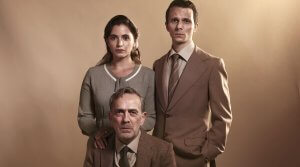
The Guardian
5 stars out of 5
The White Factory review – Holocaust drama raises troubling questions about today’s tyrants
Marylebone theatre, London
Set in a Polish ghetto, Dmitry Glukhovsky’s superb play explores the terrible choices made by people under occupation
Only the hardest heart would not feel advance goodwill towards The White Factory. Playwright Dmitry Glukhovsky and director Maxim Didenko are Jewish Russians effectively made stateless dissidents by Putin’s dictatorship and invasion of Ukraine. And the subject is the Holocaust, which culture has a duty to keep current. Warmth towards a drama, though, must be justified by the hottest creativity, which the play achieves by honouring Jewish dead and survivors while also engaging with today’s Russia and wider politics elsewhere.
Bookended by scenes in 1960s Brooklyn, the play is mainly set in Poland under Nazi occupation. It focuses on the Łódź ghetto which, unlike Warsaw’s and others, initially mitigated the scale of genocide by becoming “indispensable” – as Chaim Rumkowski, a Jewish elder, put it – to their would-be murderers by turning every building into a workplace, creating products Germany craved. The “White Factory” was an abandoned Catholic church that manufactured feather pillows. While unsentimental about real-life figures – sexual harassment by Jewish leaders is frankly dramatised – the play accepts, as surely viewers must, that their deals with the Nazis were not collaboration but tactical desperation: whatever it took to reduce the death toll.
The troubling guts of the play, though, are the naivety of believing that the lives-for-goods arrangement would be taken in good faith. This theme of the futility of trusting tyrants seems clearly aimed at Putin as much as Hitler, but viewers in theoretically benign democracies are also invited to chew and perhaps choke on the calm arguments about what should happen to a society’s elderly or industrially unproductive people.
Those who know Tom Stoppard’s Leopoldstadt, featuring a similarly menaced Austrian community, will see this as a Russian sibling script, and an alternative title might have been Litzmannstadt, as occupied Łódź was renamed. Both plays explore postwar forgetting, personal and international; the American framing hints that we are heading towards a trial but the court scene, when it comes, surprises. This small off-West End venue again delivers National Theatre-level production values. Galya Solodovnikova’s agile, sliding set begins pure title-reflecting white, on to which are projected live capture images and motion-capture graphics, before the snowy slopes are sullied by blood and, an indelible visual metaphor, the revealed contents of some pillows.
As Yosef and Rivka Kaufman, Mark Quartley and Pearl Chanda stunningly act out unimaginable calculations that go far beyond the queasily schematic bargain in William Styron’s Sophie’s Choice. As the Nazis adjust their numbers (of both “deportees” and their age), jeopardy arises for Rivka’s father – a formidable Adrian Schiller, also ably doubling as the troubled Rumkowski – and their young sons, pivotal and difficult roles played by two from a squad of talented child actors (Paul-Hector Antoine, Aron Yacobi, Leo Franky, Lucas Allermann). It is a tribute to performance, writing and production that the play is received in rapt silence underscored by stifled sobbing.